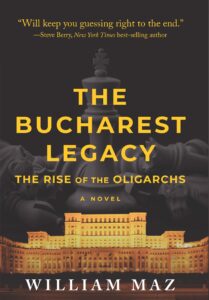With the collapse of communism in the Soviet satellite states in 1989 and in Russia in the early 1990s, the transition to various types of capitalist democracies began. This transition proceeded at a different pace in each country, and to various degrees of completion, but most shared two uncanny facts: an obscene degree of corruption and the sudden appearance of immensely rich oligarchs.
Oligarch is a term most used to refer to a person whose wealth resulted from his/her relationship with the ruling party or leader. The common image created by many articles on the rise of these oligarchs is that of savvy individuals “fooling” or “taking over” weak, ineffectual governments that were ill-equipped in democratic/capitalist norms to capture valuable state assets at bargain basement prices. During a few short years these governments sold off natural resources (oil, gas, and earth minerals), banks, chemical plants, factories, hotels, media, and transportation facilities, to a select few individuals who suddenly became the new Rockefellers and Carnegies of Eastern Europe. But how did this really happen? And who were these lucky individuals?
To begin to understand what occurred we must look at the situation before the collapse of communism. As early as the late 60s and 70s, communist governments, including that of the Soviet Union, realized that a centrally controlled system could not compete with a free-market economy. In fact, it could not build anything of quality that could be sold on the open market in the West, or even provide for the basics needs of domestic populations. These governments realized they needed two essential elements: hard currency, and people who knew how to function in the free-market economies of the West. They found both in the black market gangs that were active throughout the communist states. These gangs had long-established transportation routes and contacts in Western markets that allowed them to sell raw domestic materials, such as earth metals, grain, or oil, which they stole from the State, for hard currency, or barter them for produce or other essential products not available in communist countries.
Terrified of a popular uprising, the communist governments were eager to employ any method, including the black market, to ease the people’s plight. Thus, during the 70s the security services made unofficial pacts with criminal gangs, easing border crossings, helping with transportation, security, even finances. Much of what the gangs brought in was stolen from European companies or purchased at cut prices from European criminal gangs. After a few years, the security services created their own private companies in Western Europe to facilitate these black market operations, which included the smuggling of arms, cigarettes, narcotics, and prostitution to obtain hard currency. In this way a small cadre of individuals was formed from inside the security services and the criminal gangs who were versed in the free-market economy and world financial markets.
When the communist systems collapsed, these countries, including Russia itself, needed people who knew how to create a free-market economy and maneuver in the international finance system. The few who were knowledgeable were those members of the security services and the black marketeers who had managed the smuggling companies in the West. These individuals formed an alliance with leaders of the security services who remained in power to transfer to them the newly privatized industries at bargain basement prices. Initial capital was provided by the government from funds intended for departments of the security services that were no longer needed, such as the vast sums previously used to spy on its own citizens.
It is thus no surprise that in most of the previous communist states the new oligarchs were either former agents of the security services or were closely related to high officials in the security services (e.g. the KGB in Russia, the Securitate in Romania, the State Intelligence Agency of Bulgaria). Since the politicians in power during and immediately after the transition were members of the old communist guard, they managed the scheme, getting hefty bribes or becoming secret shareholders of the newly privatized entities. Thus, rather than the new oligarchs taking advantage of the government, they actually formed a symbiotic relationship with the government, resulting in a class of wealthy individuals either in positions of power or closely aligned with one, all getting rich either directly or indirectly by stealing the country’s assets.
In addition to bribes, the security services had another powerful tool to use against members of the government who initially resisted their corrupt schemes. Throughout the many years of communist rule, millions of dossiers were created on private citizens who the communist governments thought might pose a threat to their power. When Germany was reunited in 1990, for example, they discovered that the Stasi, the East German security service, had amassed millions of dossiers on 111 kilometers of shelves, containing compromising material on its citizens. Since the security services of the Soviet satellite states were based on the Soviet model, they all had massive intelligence on the private lives of their citizens, especially those in any position of responsibility. Most of these government officials had been corrupted during the communist years, either by directly stealing from government budgets, accepting bribes, which was the norm in the communist system, or being informants for the security services. During the transition process, the security services thus not only employed bribes but used this intelligence to blackmail officials of the government, including members of the parliament and the judiciary, to pass favorable laws and rubberstamp illicit transactions.
An element that partly explains why such corruption was allowed to continue even after the transition to democracy goes to the heart of the communist system itself. The communist bureaucracy was opaque, filled with layers of red tape on every level with little oversight. It allowed those in authority to demand bribes, even in the most mundane, everyday transactions, such as applying for a job, dealing with the cop to avoid a ticket, with the butcher to save you a slab of beef, or with the doctor to even agree to see you. Ironically, rather than creating an egalitarian society, the entire communist system functioned in the most raw capitalist manner, with those with even minimal power increasing their income from bribes or outright theft. Generations of people grew up being compromised by being either donors or recipients of bribes. Despite the transition to democracy, this system of corruption remains alive and well to this day in most of the former communist countries. It is no wonder that, until recently, these countries, which are now members of the European Union and NATO, were listed as the most corrupt in the world, only recently being replaced by Sub-Saharan countries.
Even countries like Poland and Hungary, which experienced a rapid transition to democracy without an initial period of formation of oligarchs, turned to the oligarch system after a few years. In Hungary, President Victor Orbán openly gives government contracts to his allies, friends, and relatives, even declaring that the creation of oligarchs bolsters capitalism. He calls it an “illiberal democracy.” In Poland, President Duda is doing the same. These new oligarchs, as in present Russia, further increase the power of the ruling party by buying up media companies and turning them into propaganda machines, not unlike during the communist days. It is not difficult to see how democracy can thus be stolen right out in the open by using “legal” means to consolidate political power in one party or ruler.
Others outside the former communist sphere have also learned this lesson. In Turkey, President Erdogan has used this same model for the past twenty years to create a system of crony capitalism that has consolidated media and industry in the hands of a few close friends and allies. In the US, one large media company has become a veritable propaganda machine for one of our two political parties, and the power of the wealthy to control politicians through campaign contributions has resulted in laws that favor them, with little regard to the wishes of the majority. This gradual loss of democratic institutions and values before our very eyes is a danger that must be taken seriously if we want to save our own brittle democracy.
***


















